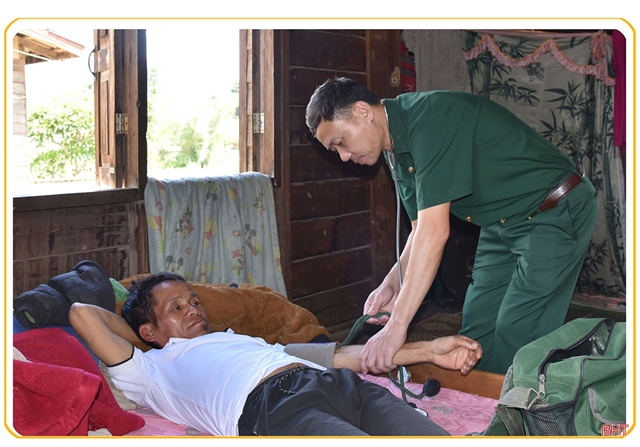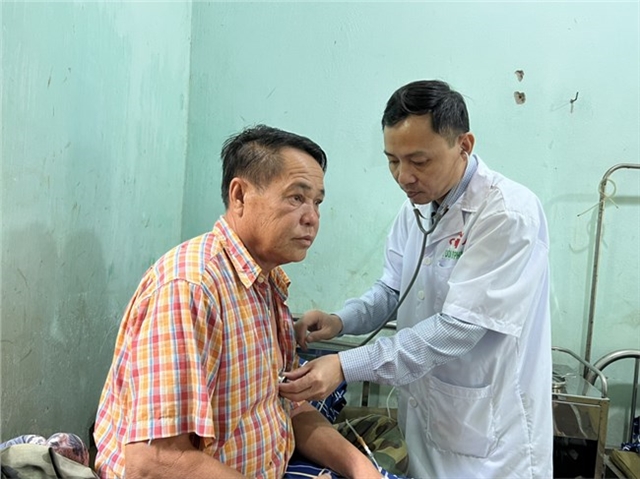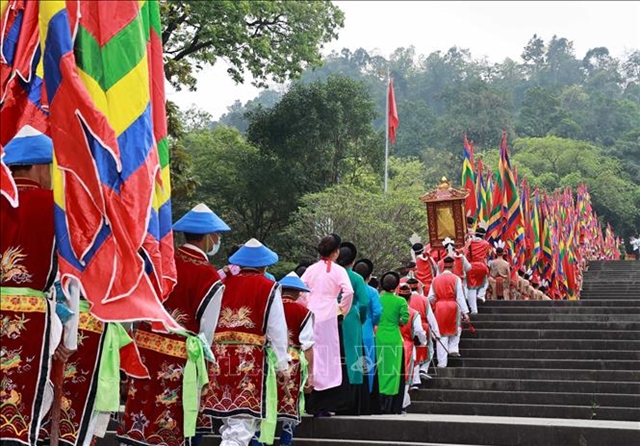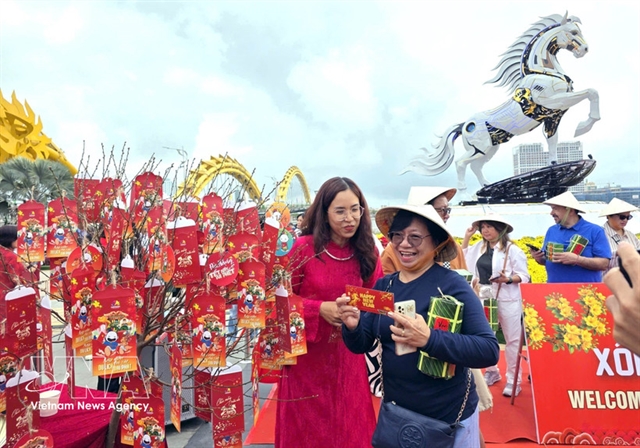 Society
Society


|
| Dr Nguyễn Việt Đức examines a villager at his home. — Photo baohatinh.vn |
HÀ TĨNH — Having worked at a clinic in the border area of Việt Nam and Laos for ten years, military doctor Nguyễn Việt Đức was known to his Lao patients as ‘father Đức’.
The Thoong Pe Medical Station, jointly built by the Việt Nam Border Guard and Hà Tĩnh Province’s authorities in Khamkeut District, Laos’ Bolikhamsai Province, is located on a high windy hill, overlooking the valley where local people live in clustered villages.
The clinic has 10 beds and admits local community members for inpatient treatment almost all year round.
Si Phong, a villager who has been treated for diabetes and high blood pressure, said he feels at home every time he visits the clinic.
Last year, he had a stroke and was paralysed. After being treated by Dr Đức for nearly two months, he has recovered and is now able to walk.
“The doctor even reduced the hospital fee for me. People from the nine villages here all come to be examined at this clinic. If asked whether we want the Vietnamese doctor to return home or not, we would probably all agree to say: No.”
“We just want him to stay here to take care of local people,” he told Voice of Vietnam (VOV) online newspaper.
Having heard of Dr Đức’s expertise, many patients in remote areas in Vientiane and Thakhek visited the clinic to meet Đức.
A Lao couple even travelled 170 km on forest roads, for ten hours, bringing rice and food to the clinic to prepare for the long days of treatment ahead.
U Day, the leading villager of Thoong Pe Village, said: “The Thoong Pe Clinic has truly become home for villagers.”
Khamkeut District is located west of the Trường Sơn range, adjacent to Hương Sơn District, Hà Tĩnh province.
The area used to be home to poor villages with lots of villagers addicted to drugs.
Local people lacked healthcare knowledge and had access to only a severely limited network of grassroots medical clinics.
All nine border villages have only one medical station. There have been many deaths due to lack of timely healthcare.

|
| Dr Nguyễn Việt Đức examines a patient at Thoong Pe clinic. — Photo vov.vn |
Dr Nguyễn Việt Đức has been in charge of the station since 2013, when he predicted a challenging path ahead in the remote area.
The day he arrived in Laos to take on the duty, he realised that the responsibility placed on his shoulders would be huge.
Having gotten used to life in the city, when arriving here he first had to adapt to being on duty in a remote area with poor medical examination and treatment facilities.
The barrier for the Vietnamese doctor is not being fluent in the local language. He then made friends with some Laotians of Vietnamese origin.
Every time he examined a patient, he called on those Vietnamese-Lao friends and asked them to translate.
After about six months of working in Laos and learning the Lao language, he could understand basic sentences for medical examination and treatment, and no longer needed the assistance.
Lao ethnic people in the border area still lived with outdated and superstitious customs. Families often hold worships, asking the "forest ghost" to forgive their illness. Due to these outdated customs, many people have died.
Dr Đức often visits every family to talk to the villagers, examines them and provides free medicine.
He joked that medical record of every family has been inked in his mind after ten years. The number of these records has climbed to the hundreds.
Many emergency cases were treated promptly by Dr Đức. A lot of incurable diseases were discovered and transferred to higher levels for treatment. Gradually, more people abandoned beliefs in outdated customs and practices, and followed Đức’s consultation.
Since the beginning of this year, Thoong Pe Clinic has examined and treated more than 3,600 people and given free medicine to nearly 1,800 people.
Not only treating local people, the clinic is also a trusted address for border guards of Bolikhamsai Province.
As a person who has been treated by Dr Đức many times, Major Kham Pa Soy Luang Lat Pan Dit, deputy political officer, said: “Having a Vietnamese doctor working here, we feel secure. Đức has coordinated with us on border patrols and acted as a translator for military forces of both sides.”
Đức and his colleagues regularly coordinate with local health officials to train local people on how to prevent common diseases and maintain environmental sanitation.
Leave family behind
Having worked in this remote area for a long time, Dr Đức has been far from his wife and two children for a decade.
Though he rarely has time to return home, Đức is lucky to have a sharing wife who is working as a lecturer at Hà Tĩnh University.
Đậu Thị Kim Quyên, Dr Đức’s wife, said she understands her husband's duties and feels his love and enthusiasm for work, so she always tries to share the family caring task with him.
Every New Year holiday, without her husband by her side, she feels a little sad, but she is lucky to be close to Đức’s brothers, sisters and colleagues at home.
“I just hope that he can feel secure at work, and complete his tasks well,” she said.
“Let your wife and your colleagues take care of all the work at home,” she said in a message to her husband. —VNS

.jpg)


